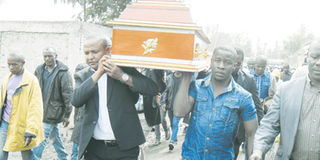Slain Arusha researchers remembered

Mourners carry the coffin of one of researchers from Arusha Selian Agricultural Research Institute (Sari) Teddy Lumanga, who was killed in Dodoma on October 1 last year. The one year death anniversary was held in Arusha on Friday. PHOTO | FILBERT RWEYEMAMU
What you need to know:
- There was also a sombre mood as speakers in the vigil recounted the horror moments when the trio attached to the Selian Agricultural Research Institute (Sari) met their tragic death in Dodoma Region while on field work.
Arusha. Jungle justice came under fire once again on Friday as Arusha residents marked one year since the brutal murder of three agricultural researchers working here.
There was also a sombre mood as speakers in the vigil recounted the horror moments when the trio attached to the Selian Agricultural Research Institute (Sari) met their tragic death in Dodoma Region while on field work.
The slain Theresia Nguma, Faraji Mafuru and Nicas Magazini were hacked to death at Mvumi-Iringa Village on October 1 during the field surveys after they were mistaken for people who collect blood without authorisation.
At least 30 people from the area have been arrested and charged in court with the killings which sent the entire research fraternity in the country shocked.
During Friday’s marking of the sad moment, researchers from the Arusha-based agricultural centre and allied institutions reiterated concerns on their safety, especially when working in remote areas.
A senior official of the Arusha Regional Secretariat, Mr Hargeney Chitukuro, warned people against taking the law into their own hands, saying such actions can result in tragedies such as the killing of the said field workers. He said the lives of the trio would have been spared had the villagers taken trouble to verify who they were.
Mr Chitukuro argued that in such situations, the strangers should be reported to the police or local government authorities instead of being slashed with axes and machetes as was the case on the tragic incident.
“This is a wakeup call that we should not take law in our hands,” he insisted.
The director of Research in the ministry of Agriculture, Livestock and Fisheries Development, Dr Hussein Mansoor, said the ministry and relatives of the victims were still waiting for the outcome of the case.
“We have great faith in our judicial system,” he told a gathering in attendance who were keen on getting updates of the on-going case. Reports from Dodoma had it that the 30-plus suspects have been arraigned and have appeared in court at least five times.
A senior official of the institute, Mr Ramadhani Ngatoluwa, said a total of Sh27 million has been raised to assist meeting the cost of education for the children of the victims.
He added that the trio had been dispatched to Dodoma to carry out soil analysis under a nationwide soil mapping project aimed to improve agricultural productivity.




